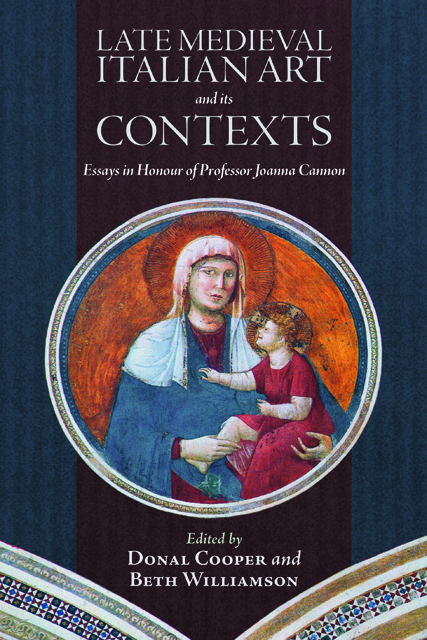Book contents
- Frontmatter
- Contents
- List of Illustrations
- List of Contributors
- Acknowledgements
- List of Abbreviations
- 1 Introduction: Circling Giotto
- 2 Holy Wood / ‘sacra tavola’: Saint Dominic and the Memory of Miracles in Bologna
- 3 The Sculpted Saint: A Statue of Saint Francis in Siena
- 4 Guccio di Mannaia and the Concept of a ‘Franciscan’ Chalice
- 5 ‘Speculum sine macula’: The Trittico di Santa Chiara in Trieste as an Object of Clarissan Devotion
- 6 The Siena Connection: A Franciscan Provincial Minister between Tuscany and Assisi at the Dawn of the Trecento
- 7 Simone Martini’s ‘Treaty with the House of Santa Fiora’ in Siena’s Palazzo Pubblico: Its Date and Significance
- 8 Crisis and Charity in Fourteenth-Century Florence: Ambrogio Lorenzetti’s Saint Nicholas Panels for San Procolo
- 9 Father of Light: Giotto and the Beatific Vision in the Baroncelli Chapel
- 10 Painter-Illuminator Workshops and the Church of San Giorgio a Ruballa: The Case of Bernardo Daddi and Pacino di Bonaguida
- 11 Patterns of Holiness: A Virgin Lactans in a Franciscan Context
- 12 A New Angle on Simone Martini’s Holy Family
- 13 Artistic Appropriation, Institutional Identity, and Civic Religion in Fourteenth-Century Siena: The Byzantine Treasury of the Hospital of Santa Maria della Scala
- 14 Visual Religious Education in Late Medieval Florence: Zanobi Perini, The Leggenda di Santo Tobia, and The Misericordia
- 15 Saints and Status in Late Medieval and Early Renaissance Florence
- Select Bibliography
- Publications by Joanna Cannon
- Index
- Tabula Gratulatoria
- Backmatter
6 - The Siena Connection: A Franciscan Provincial Minister between Tuscany and Assisi at the Dawn of the Trecento
Published online by Cambridge University Press: 20 December 2022
- Frontmatter
- Contents
- List of Illustrations
- List of Contributors
- Acknowledgements
- List of Abbreviations
- 1 Introduction: Circling Giotto
- 2 Holy Wood / ‘sacra tavola’: Saint Dominic and the Memory of Miracles in Bologna
- 3 The Sculpted Saint: A Statue of Saint Francis in Siena
- 4 Guccio di Mannaia and the Concept of a ‘Franciscan’ Chalice
- 5 ‘Speculum sine macula’: The Trittico di Santa Chiara in Trieste as an Object of Clarissan Devotion
- 6 The Siena Connection: A Franciscan Provincial Minister between Tuscany and Assisi at the Dawn of the Trecento
- 7 Simone Martini’s ‘Treaty with the House of Santa Fiora’ in Siena’s Palazzo Pubblico: Its Date and Significance
- 8 Crisis and Charity in Fourteenth-Century Florence: Ambrogio Lorenzetti’s Saint Nicholas Panels for San Procolo
- 9 Father of Light: Giotto and the Beatific Vision in the Baroncelli Chapel
- 10 Painter-Illuminator Workshops and the Church of San Giorgio a Ruballa: The Case of Bernardo Daddi and Pacino di Bonaguida
- 11 Patterns of Holiness: A Virgin Lactans in a Franciscan Context
- 12 A New Angle on Simone Martini’s Holy Family
- 13 Artistic Appropriation, Institutional Identity, and Civic Religion in Fourteenth-Century Siena: The Byzantine Treasury of the Hospital of Santa Maria della Scala
- 14 Visual Religious Education in Late Medieval Florence: Zanobi Perini, The Leggenda di Santo Tobia, and The Misericordia
- 15 Saints and Status in Late Medieval and Early Renaissance Florence
- Select Bibliography
- Publications by Joanna Cannon
- Index
- Tabula Gratulatoria
- Backmatter
Summary
During the febrile summer of 1311 the long-standing tensions within the Franciscan movement over the correct observance of poverty exploded into open polemic. In 1309 Pope Clement V had invited the Order to address accusations that the observance of the Franciscan rule, and its central tenet of poverty, had collapsed. The Pope hoped to prepare the ground for a resolution of the Order’s internal divisions at the Church Council he had called at Vienne, but the debate became increasingly acrimonious as both sides – the rigorist faction or so-called ‘Spirituals’ on the one hand, and the establishment or ‘Community’ on the other – dug in and traded accusations. For Ubertino da Casale, the leading voice amongst the Spirituals, some of the most notorious abuses lay in the Order’s architecture. In his Declaratio, composed in Avignon probably in August 1311, Ubertino castigated the friars of the Tuscan province with characteristic fury and sarcasm:
For there are very few houses in the Order where there are not such excesses, and they know [this] very well, those who are promoters of such excesses, and who call themselves promoters and patrons of the Order and who debase the Order’s rules through such things. And since no buildings may be erected without the authority of the Provincial Ministers, [and] since there is no province in the Order in which there are not multiple excesses in buildings, they put forward a single minister to be properly punished for such things, because if we know of nothing in the Order, still we know well that those corrupt in these things are praised. And although the case of [the Tuscan Provincial Minister] Fra Jacobo de Tundo may be cited, who was punished like this on account of [his] excesses, still [he was] not properly but [only] superficially punished by the Minister General, and instead was made Provincial Minister for the [Umbrian] province of Saint Francis by its chapter, even though someone may be greatly lax in life and not above censure, as explained in the Rotulus. So too Fra Manfredo Bonfi, Fra Giovanni of Siena, Fra Andrea de’ Tolomei, Fra Illuminato of Florence and many others in the same province [of Tuscany] and in many other provinces could be cited as examples, into which [provinces] the doers of such things are sent out by the Minister General himself to be lords of the provinces and patrons of the houses, which are therefore built excessively.
- Type
- Chapter
- Information
- Late Medieval Italian Art and its ContextsEssays in Honour of Professor Joanna Cannon, pp. 89 - 110Publisher: Boydell & BrewerPrint publication year: 2022



